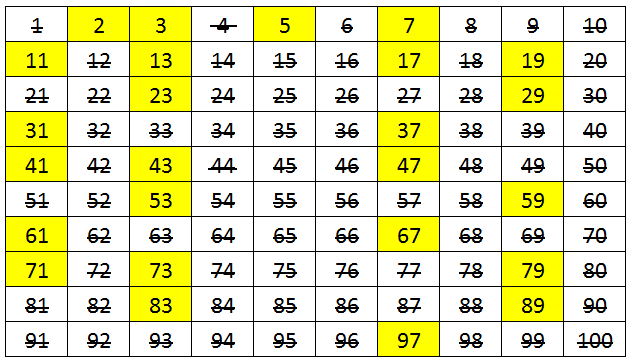Shubham Borkar
Answers!
Davneet Singh
May 2, 2017, 6:44 p.m.
Hello Shubham,
Prime numbers are those numbers which are divisible by only 1 and itself.
For example - 2 is a prime number.
From 1 to 100, prime numbers are

Let's check how we find if 53 is a prime number. Let n = 53
We follow the following steps to check if a number is prime or not
Step
Description
Example
1
Is n a positive whole number >= 2? If not, n is 1, or 0, or some negative number, or decimal number. None of these are prime. If n is a whole number >=2, continue to the next step.
53 is a positive whole number >= 2, so continue to the next step.
2
Does n = 2? If so, it is prime. If not, continue to the next step.
53 does not equal 2, so continue to the next step.
3
Is n an even number? If so, it is not prime, because 2 is the only even prime number and we eliminated 2 in the previous step. If n is not even, continue.
53 is not an even number, so continue to the next step.
4
Is n = 5? If so, n is prime. If not, continue to the next step.
53 does not equal 5, so continue.
5
Is n a multiple of 5; that is, is the digit in its ones' place 0 or 5? If so, n is not prime. If n is not a multiple of 5, continue to the next step.
53 is not a multiple of 5, so continue.
6
Is n = 3? If so, n is prime. If not, continue to the next step.
53 does not equal 3, so continue.
7
Divide n by 3. If you get a remainder, continue to the next step. If n divided by 3 results in no remainder, then n is not prime.
53 divided by 3 = 17 with a remainder of 2, so continue.
8
Is n = 7? If so, n is prime. If not, continue to the next step.
53 does not equal 7, so continue.
9
Divide n by 7. If you get a remainder, n is prime. If n divided by 7 leaves no remainder, n is not prime.
53 divided by 7 = 7 with a remainder of 4; therefore 53 is a prime number. Its only factors are itself and 1.
Source: http://www.scsb.org/trh/prime/
Comment
Answer the question...
Davneet Singh
Hello Shubham,
Prime numbers are those numbers which are divisible by only 1 and itself.
For example - 2 is a prime number.
From 1 to 100, prime numbers are

Let's check how we find if 53 is a prime number. Let n = 53
We follow the following steps to check if a number is prime or not
| Step | Description | Example |
|---|---|---|
| 1 | Is n a positive whole number >= 2? If not, n is 1, or 0, or some negative number, or decimal number. None of these are prime. If n is a whole number >=2, continue to the next step. | 53 is a positive whole number >= 2, so continue to the next step. |
| 2 | Does n = 2? If so, it is prime. If not, continue to the next step. | 53 does not equal 2, so continue to the next step. |
| 3 | Is n an even number? If so, it is not prime, because 2 is the only even prime number and we eliminated 2 in the previous step. If n is not even, continue. | 53 is not an even number, so continue to the next step. |
| 4 | Is n = 5? If so, n is prime. If not, continue to the next step. | 53 does not equal 5, so continue. |
| 5 | Is n a multiple of 5; that is, is the digit in its ones' place 0 or 5? If so, n is not prime. If n is not a multiple of 5, continue to the next step. | 53 is not a multiple of 5, so continue. |
| 6 | Is n = 3? If so, n is prime. If not, continue to the next step. | 53 does not equal 3, so continue. |
| 7 | Divide n by 3. If you get a remainder, continue to the next step. If n divided by 3 results in no remainder, then n is not prime. | 53 divided by 3 = 17 with a remainder of 2, so continue. |
| 8 | Is n = 7? If so, n is prime. If not, continue to the next step. | 53 does not equal 7, so continue. |
| 9 | Divide n by 7. If you get a remainder, n is prime. If n divided by 7 leaves no remainder, n is not prime. |
53 divided by 7 = 7 with a remainder of 4; therefore 53 is a prime number. Its only factors are itself and 1. |
Source: http://www.scsb.org/trh/prime/
Comment
Hi, it looks like you're using AdBlock :(
Displaying ads are our only source of revenue. To help Teachoo create more content, and view the ad-free version of Teachooo... please purchase Teachoo Black subscription.
Please login to view more pages. It's free :)
Teachoo gives you a better experience when you're logged in. Please login :)
Solve all your doubts with Teachoo Black!
Teachoo answers all your questions if you are a Black user!